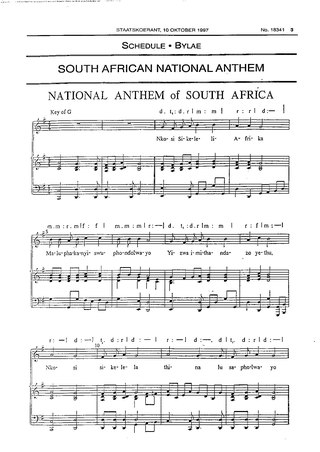
The national anthem of South Africa was adopted in 1997 and is a hybrid song combining extracts of the 19th century Xhosa hymn "Nkosi Sikelel' iAfrika" and the Afrikaans song that was used as the South African national anthem during the apartheid era, "Die Stem van Suid-Afrika", with new English lyrics.

Die Stem van Suid-Afrika, also known as "The Call of South Africa" or simply "Die Stem", was the national anthem of South Africa during the apartheid era. There are two versions of the song, one in English and the other in Afrikaans, which were in use early on in the Union of South Africa alongside God Save the Queen and as the sole anthem after South Africa became a republic. It was the sole national anthem from 1957 to 1994, and shared co-national anthem status with "God Save the King/Queen" from 1938 to 1957. After the end of apartheid, it was retained as a co-national anthem along with "Nkosi Sikelel' iAfrika" until 1997, when a new hybrid song incorporating elements of both songs was adopted as the country's new national anthem, which is still in use.
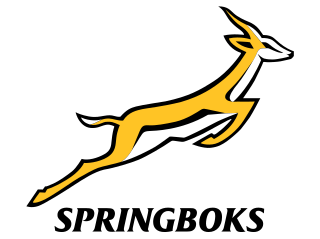
The South Africa national rugby union team, commonly known as the Springboks, is the country's national team governed by the South African Rugby Union. The Springboks play in green and gold jerseys with white shorts. Their emblem is a native antelope, the Springbok, which is the national animal of South Africa. The team has been representing South Africa in international rugby union since 30 July 1891, when they played their first test match against a British Isles touring team. They are currently the reigning World Champions and have won the World Cup on three occasions,. The Springboks are equalled with the All Blacks with three World Cups.
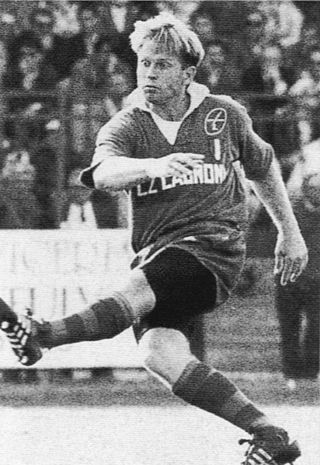
Hendrik Egnatius 'Naas' Botha is a South African former rugby union player, who played for Northern Transvaal and South Africa.

"Nkosi Sikelel' iAfrika" is a Christian hymn originally composed in 1897 by Enoch Sontonga, a Xhosa clergyman at a Methodist mission school near Johannesburg.
The 1997 British Lions tour to South Africa was a series of matches played by the British Lions rugby union team in South Africa. This tour followed the Lions' 1993 tour to New Zealand and preceded their 2001 tour to Australia. The much-anticipated tour was the first after the end of apartheid in South Africa, and the first Lions tour since rugby union turned professional. It was only the third time that a touring side had won a test series in South Africa; the others being the 1974 Lions and the 1996 All Blacks.

Daniël Hartman Craven was a South African rugby union player (1931–1938), national coach, national and international rugby administrator, academic, and author. Popularly known as Danie, Doc, or Mr Rugby, Craven's appointment from 1949 to 1956 as coach of the Springboks signalled "one of the most successful spells in South African rugby history" during which the national team won 74% of their matches. While as a player Craven is mostly remembered as one of rugby's greatest dive-passing scrumhalves ever, he had also on occasion been selected to play for the Springboks as a centre, fly-half, No.8, and full-back. As the longest-serving President of the South African Rugby Board (1956–93) and chairman of the International Rugby Board, Craven became one of the best-known and most controversial rugby administrators. In 1969, Craven sparked outrage among anti-apartheid activists when he allegedly said, "There will be a black springbok over my dead body". Craven denied saying this and in his later career promoted coloured training facilities.
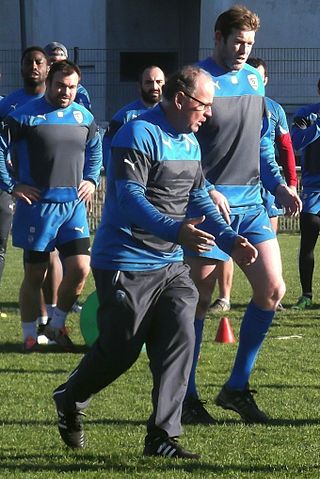
Jake White is a professional rugby union coach and former coach of the South African national team – the Springboks – whom he coached to victory in 2007 Rugby World Cup and the 2004 Tri Nations. White also coached the Under-21 Springbok side to victory in the Under-21 World Cup in 2002. He was coach of the Brumbies in the Super Rugby from 2012, but resigned with two years remaining on his contract in 2013 to return to South Africa. On returning to South Africa, he coached the Sharks for a single season, explaining he wanted to seek international opportunities. This arose in a technical role with the Tongan national team. After assisting Tonga in their 3 Test European Tour in 2014, White was announced as Montpellier's new boss, overseeing all coaching aspects for the club.
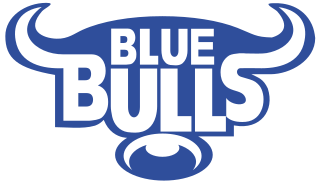
The Blue Bulls is a South African rugby union team that participates in the annual Currie Cup tournament. They are governed by the Blue Bulls Rugby Union and are based at Loftus Versfeld Stadium in Pretoria, Gauteng province.
Errol George Tobias is a former South African rugby union player, and the first player of colour to play in a test match for the South African national side. He gained six caps between 1981 and 1984 when the country was still following the policy of apartheid. Tobias's selection paved the way for other black players to be added to the national team: first Avril Williams, and later, Avril's nephew, Chester Williams. Of his 21 games for the Springboks, six were tests.

The 2009 British & Irish Lions tour to South Africa was an international rugby union tour which took place in South Africa from May to July 2009.
Danie Gerber is a former South African rugby union player, who played for South Africa between 1980 and 1992. He played mainly at inside or outside centre, but also on the wing.

The 1995 Rugby World Cup Final was the final match of the 1995 Rugby World Cup, played in South Africa. The match was played at Ellis Park Stadium, Johannesburg on 24 June 1995 between the host nation, South Africa, and New Zealand.
The 1960 New Zealand rugby union tour of South Africa, was a series of rugby union matches played by the New Zealand national rugby union team in South Africa and Rhodesia.
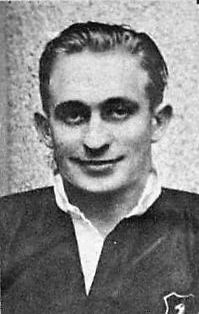
Gerhard Hamilton Brand was a Springbok rugby union footballer who played in 16 tests between 1928 and 1938. Brand has been described as the best kicker of his era, as well as a "magnificent defensive player" with a "wonderful tackle". According to Guinness World Records he executed the longest drop goal in rugby union to date. Brand's 55 test career points for the Springboks set a 27-year record (1938–65), which was eventually surpassed by Keith Oxlee.
Rugby union and apartheid had a complex and supportive relationship. From 1948 to 1994, international rugby relations with the country, and also the non-integrated nature of rugby within South Africa drew frequent controversy. South Africa remained a member of the International Rugby Board (IRB) throughout the apartheid era.
The History of the South Africa national rugby union team dates back to 1891, when the British Lions first toured South Africa where they played against South African representative sides. The South Africa national rugby union team played few international matches during a period of international sanctions due to apartheid. Since the end of apartheid in 1994, South Africa has once again fully participated in international rugby.

The flag of South Africa from 1928 to 1994 was the flag of the Union of South Africa from 1928 to 1961 and later the flag of the Republic of South Africa until 1994. It was also the flag of South West Africa to 1990, when that territory was under South African administration. Based on the Dutch Prince's Flag, it contained the flag of the United Kingdom, the flag of the Orange Free State and the flag of the South African Republic in the centre. A nickname for the flag was Oranje, Blanje, Blou.
Jan Theodorus 'Theo' Jansen van Rensburg, is a former South African rugby union player who played for the South Africa national rugby union team. He played as fullback.












